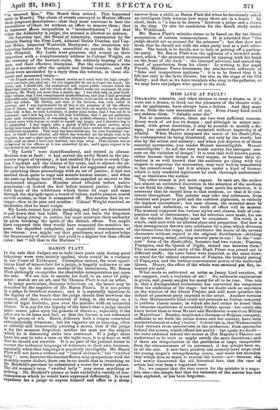BARON PLATT.
Jr the rule that Judges are to hold their posts only during good behaviour were very strictly applied, there would be a vacancy in the Court of Exchequer. Corruption indeed, the most oppro- brious kind of misconduct for a judge, is happily unknown to our bench ; but in the minor morals of the bienseances, Mr. Baron Platt strikingly exemplifies the charitable interpretation put upon the rule. We are fain to ascribe his fault to an error of judg- ment: Morals are an art, and Sir Thomas Platt is not an artist.
In many particulars, decorous behaviour on the bench may be described by the negative of Mr. Baron Platt's. It is not pretty in a judge to browbeat counsel ; and it is especially injurious to the dignity of the bench that the judge should first browbeat the counsel, and then, when convicted of being in the wrong on a point of legal doctrine, pass over the mistake with an uncandid silence. It is no for the dignity of the bench that a judge should make coarse jokes upon the genesis of diseases ; especially if the jokes are to be-lame and bad, so that the licence is not redeemed by the graces of wit. Baron Alderson hath a tongue somewhat extra-judicially, vivacious; but his vagaries are so amusing, often so adroitly and humorously pointing a moral, that if the judge is for the moment forgotten, neither the man nor the subject which he is discussing sinks into contempt. If a judge must leave his seat to take a turn on the tight rope, it is at least as well that he should not stumble. It is no part of the judicial duties to correct the technical language of witnesses in their own business, especially when that language is popularly intelligible. Mr. Baron Platt will not have a witness say tumid abdomen," but "swelled belly " : now, however the learned Baron may sympathize with the monthly-nurse dialect, there can be no doubt that in trenching on Dr. Benfield's province he substituted a worse for a better phrase. The old woman's term " swelled belly" may mean anything or nothing: Dr. Benfield's phrase at least excluded a variety of con- tumescences which he would have expressed differently. It is not expedienc for a judge to expose himself and office to a sharp answer from a child, as Baron Platt did when he facetiously asked an intelligent little wane% how many there are in a dozen ? In short, there is "a line to be drawn" between a judge and a clown in the ring. Or else let candidates for the bench study under Mr. Widdicomb.
Mr. Baron Platt's mistake seems to be based on the too literal acceptation of certain commonplaces. It is admitted that "the judge should act as counsel for the prisoner"; but that does not mean that he should act with the same party zeal as a paid advo- cate. The bench is to decide, not to help in getting off a particu- lar party. Mr. Baron Platt won the applause of a crowded audi- ence, which "the prisoner accompanied by tapping with his hand on the front of the dock ": the ermined advocate had earned the meed of approbation from his client! In writing to her pupil Parodi, Madame Pasta denounces the mischievous influence of "false and inopportune applause ": it is to be feared that it is felt not only in the lyric theatre, but also on the stage of the Old Bailey ; and that as we have vocalists who sing to the galleries, so we may have our judges who speak to the dock.


























 Previous page
Previous page